Paul Marks Library
Providing the best guaranteed solutions for Nursing assignments.
- 2600
- 0
- 280
Community
- Followers
- Following
177 Reviews received
2889 items
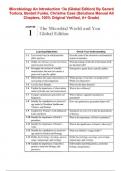
Microbiology An Introduction 13e (Global Edition) By Gerard Tortora, Berdell Funke, Christine Case (Solutions Manual All Chapters, 100% Original Verified, A+ Grade)
Microbiology An Introduction 13e (Global Edition) By Gerard Tortora, Berdell Funke, Christine Case (Solutions Manual All Chapters, 100% Original Verified, A+ Grade) The Microbial World and You Global Edition Chapter Summary Microbes in Our Lives (p. 28) The Microbiome (pp. 28–29) ASM 5.4: Microorganisms, cellular and viral, can interact with both human and nonhuman hosts in beneficial, neutral, or detrimental ways. ASM 6.2: Microorganisms provide essential models that give us...
- Exam (elaborations)
- • 324 pages •
Microbiology An Introduction 13e (Global Edition) By Gerard Tortora, Berdell Funke, Christine Case (Solutions Manual All Chapters, 100% Original Verified, A+ Grade) The Microbial World and You Global Edition Chapter Summary Microbes in Our Lives (p. 28) The Microbiome (pp. 28–29) ASM 5.4: Microorganisms, cellular and viral, can interact with both human and nonhuman hosts in beneficial, neutral, or detrimental ways. ASM 6.2: Microorganisms provide essential models that give us...
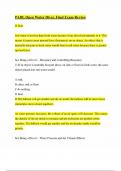
PADI, Open Water Diver|Final Exam Review|Final Assessment|Exam Study Guide|Certification|Final exam (2 versions)|Being a Diver I
PADI, Open Water Diver, Final Exam Review PADI Open Water Diver Final Assessment PADI Open Water Exam Study Guide PADI Open Water Diver Certification PADI Open Water Diver Final Exam PADI Open Water Diver Final Exam 2024 PADI Open Water - Being a Diver I
- Package deal
- • 8 items •
- PADI, Open Water Diver, Final Exam Review • Exam (elaborations)
- PADI Open Water Diver Final Assessment • Exam (elaborations)
- PADI Open Water Exam Study Guide • Exam (elaborations)
- PADI Open Water Diver Certification • Exam (elaborations)
- PADI Open Water Diver Final Exam • Exam (elaborations)
- And more ….
PADI, Open Water Diver, Final Exam Review PADI Open Water Diver Final Assessment PADI Open Water Exam Study Guide PADI Open Water Diver Certification PADI Open Water Diver Final Exam PADI Open Water Diver Final Exam 2024 PADI Open Water - Being a Diver I
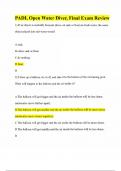
PADI, Open Water Diver, Final Exam Review
PADI, Open Water Diver, Final Exam Review 1) If an object is neutrally buoyant (does not sink or float) in fresh water, the same object placed into salt water would A sink. B either sink or float. C do nothing. D float. D 2) I blow up a balloon, tie it off, and take it to the bottom of the swimming pool. What will happen to the balloon and the air inside it? A The balloon will get bigger and the air inside the balloon will be less dense (molecules move further apart). B The balloon ...
- Package deal
- Exam (elaborations)
- • 29 pages •
PADI, Open Water Diver, Final Exam Review 1) If an object is neutrally buoyant (does not sink or float) in fresh water, the same object placed into salt water would A sink. B either sink or float. C do nothing. D float. D 2) I blow up a balloon, tie it off, and take it to the bottom of the swimming pool. What will happen to the balloon and the air inside it? A The balloon will get bigger and the air inside the balloon will be less dense (molecules move further apart). B The balloon ...
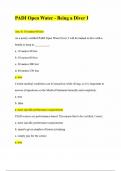
PADI Open Water - Being a Diver I
PADI Open Water - Being a Diver I Ans: b. 18 metres/60 feet As a newly certified PADI Open Water Diver, I will be trained to dive with a buddy as deep as __________. a. 10 metres/30 feet b. 18 metres/60 feet c. 30 metres/100 feet d. 40 metres/130 feet a. true Certain medical conditions can be hazardous while diving, so it is important to answer all questions on the Medical Statement honestly and completely. a. true b. false a. meet specific performance requirements PADI courses are...
- Package deal
- Exam (elaborations)
- • 21 pages •
PADI Open Water - Being a Diver I Ans: b. 18 metres/60 feet As a newly certified PADI Open Water Diver, I will be trained to dive with a buddy as deep as __________. a. 10 metres/30 feet b. 18 metres/60 feet c. 30 metres/100 feet d. 40 metres/130 feet a. true Certain medical conditions can be hazardous while diving, so it is important to answer all questions on the Medical Statement honestly and completely. a. true b. false a. meet specific performance requirements PADI courses are...
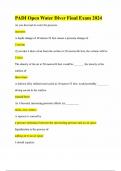
PADI Open Water Diver Final Exam 2024
PADI Open Water Diver Final Exam 2024 As you descend in water the pressure increases A depth change of 10 meters/33 feet causes a pressure change of 2 bar/ata if you take 6 liters of air from the surface to 20 metres/66 feet, the volume will be 2 liters The density of the air at 20 meters/66 feet would be _______ the density at the surface of three times A balloon fully inflated and sealed at 10 meters/33 feet, would probably ________ during ascent to the surface. expand/burst As I de...
- Package deal
- Exam (elaborations)
- • 35 pages •
PADI Open Water Diver Final Exam 2024 As you descend in water the pressure increases A depth change of 10 meters/33 feet causes a pressure change of 2 bar/ata if you take 6 liters of air from the surface to 20 metres/66 feet, the volume will be 2 liters The density of the air at 20 meters/66 feet would be _______ the density at the surface of three times A balloon fully inflated and sealed at 10 meters/33 feet, would probably ________ during ascent to the surface. expand/burst As I de...
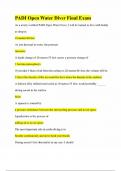
PADI Open Water Diver Final Exam
PADI Open Water Diver Final Exam As a newly certified PADI Open Water Diver, I will be trained to dive with buddy as deep as 18 metres/60 feet As you descend in water, the pressure increases A depth change of 10 metres/33 feet causes a pressure change of 1 bar/ata (atmosphere) if you take 6 liters of air from the surface to 20 metres/66 feet, the volume will be 2 litres (the density of the air would be three times the density at the surface) A balloon fully inflated and sealed at 10 met...
- Package deal
- Exam (elaborations)
- • 15 pages •
PADI Open Water Diver Final Exam As a newly certified PADI Open Water Diver, I will be trained to dive with buddy as deep as 18 metres/60 feet As you descend in water, the pressure increases A depth change of 10 metres/33 feet causes a pressure change of 1 bar/ata (atmosphere) if you take 6 liters of air from the surface to 20 metres/66 feet, the volume will be 2 litres (the density of the air would be three times the density at the surface) A balloon fully inflated and sealed at 10 met...
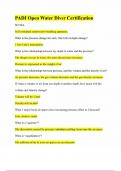
PADI Open Water Diver Certification
PADI Open Water Diver Certification SCUBA Self contained underwater breathing apparatus What is the pressure change for each 10m/33ft of depth change? 1 bar/1 ata/1 atmosphere What is the relationship between my depth in water and the pressure? The deeper you go in water, the more the pressure increases Pressure is expressed as the weight of air What is the relationship between pressure, and the volume and the density of air? As pressure increases, the gas volume decreases and the gas d...
- Package deal
- Exam (elaborations)
- • 23 pages •
PADI Open Water Diver Certification SCUBA Self contained underwater breathing apparatus What is the pressure change for each 10m/33ft of depth change? 1 bar/1 ata/1 atmosphere What is the relationship between my depth in water and the pressure? The deeper you go in water, the more the pressure increases Pressure is expressed as the weight of air What is the relationship between pressure, and the volume and the density of air? As pressure increases, the gas volume decreases and the gas d...
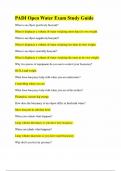
PADI Open Water Exam Study Guide
PADI Open Water Exam Study Guide When is an object positively buoyant? When it displaces a volume of water weighing more than its own weight. When is an object negatively buoyant? When it displaces a volume of water weighing less than its own weight. When is an object neutrally buoyant? When it displaces a volume of water weighing the same as its own weight. Why two pieces of equipment do you use to control your buoyancy? BCD, Lead weight What does buoyancy help with when you are underw...
- Package deal
- Exam (elaborations)
- • 17 pages •
PADI Open Water Exam Study Guide When is an object positively buoyant? When it displaces a volume of water weighing more than its own weight. When is an object negatively buoyant? When it displaces a volume of water weighing less than its own weight. When is an object neutrally buoyant? When it displaces a volume of water weighing the same as its own weight. Why two pieces of equipment do you use to control your buoyancy? BCD, Lead weight What does buoyancy help with when you are underw...
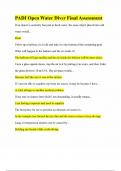
PADI Open Water Diver Final Assessment
PADI Open Water Diver Final Assessment If an object is neutrally buoyant in fresh water, the same object placed into salt water would... Float I blow up a balloon, tie it off, and take it to the bottom of the swimming pool. What will happen to the balloon and the air inside it? The balloon will get smaller and the air inside the balloon will be more dense I turn a glass upside down, trap the air in it by putting it in water, and then I take the glass down to 10 m/33 ft. The air space would....
- Package deal
- Exam (elaborations)
- • 8 pages •
PADI Open Water Diver Final Assessment If an object is neutrally buoyant in fresh water, the same object placed into salt water would... Float I blow up a balloon, tie it off, and take it to the bottom of the swimming pool. What will happen to the balloon and the air inside it? The balloon will get smaller and the air inside the balloon will be more dense I turn a glass upside down, trap the air in it by putting it in water, and then I take the glass down to 10 m/33 ft. The air space would....

PADI, Open Water Diver, Final Exam Review
PADI, Open Water Diver, Final Exam Review D float. Salt water is heavier than fresh water because it has dissolved minerals in it. This means it causes more upward force (buoyancy) on an object. An object that is neutrally buoyant in fresh water would float in salt water because there is greater upward force. See Being a Diver I - Buoyancy and Controlling Buoyancy. 1) If an object is neutrally buoyant (does not sink or float) in fresh water, the same object placed into salt water would ...
- Package deal
- Exam (elaborations)
- • 32 pages •
PADI, Open Water Diver, Final Exam Review D float. Salt water is heavier than fresh water because it has dissolved minerals in it. This means it causes more upward force (buoyancy) on an object. An object that is neutrally buoyant in fresh water would float in salt water because there is greater upward force. See Being a Diver I - Buoyancy and Controlling Buoyancy. 1) If an object is neutrally buoyant (does not sink or float) in fresh water, the same object placed into salt water would ...

Official NHA Exam Questions – NAB-Answered-2023/2024
Notary Practice Test 1 exam 2024 with 100% correct answers
Test bank for a manual of laboratory and diagnostic tests 7th edition frances t fischbach
TCI Training Cornell Exam 2023 Questions and Answers (Verified 100%)
NHA NOW EKG Technician Practice Test/Complete Questions and answers/100% Verified/Newly Updated 2023-2024